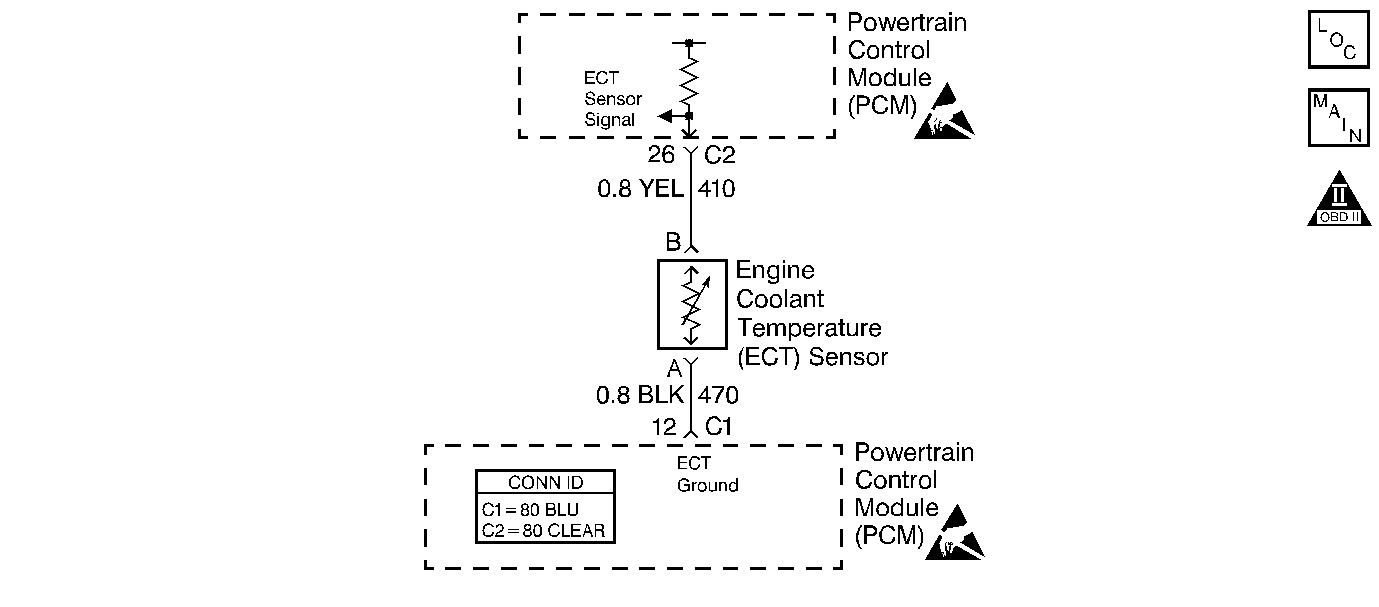
Circuit Description
The Engine Coolant Temperature (ECT) sensor is a thermistor mounted in the engine coolant stream. The PCM applies a voltage (about 5.0 volts) through a pull up resistor to the ECT signal circuit. When the engine coolant is cold, the sensor (thermistor) resistance is high; therefore, the PCM will measure a high signal voltage. As the engine coolant warms, the sensor resistance becomes less, and the ECT signal voltage measured at the PCM drops. With a fully warmed up engine, the ECT signal voltage should measure about 1.5 to 2.0 volts. If the PCM detects an ECT signal volage that is intermittently greater than the range of the ECT sensor, DTC P1115 will set.
Conditions for Running the DTC
Engine has been running for longer than 3 seconds.
Conditions for Setting the DTC
The ECT sensor intermittently indicates a coolant temperature less than -34°C (-30°F).
Action Taken When the DTC Sets
| • | The PCM will not illuminate the Malfunction Indicator Lamp (MIL). |
| • | The PCM will store conditions which were present when the DTC set as Fail Records data only. This information will not be stored as Freeze Frame data. |
Conditions for Clearing the MIL/DTC
| • | A history DTC will clear after 40 consecutive warm-up cycles have occurred without a malfunction. |
| • | DTC can be cleared by using the scan tool Clear Info function or by disconnecting the PCM battery feed. |
Diagnostic Aids
Check for the following conditions:
| • | Poor connection at the PCM. |
| Inspect harness connectors for backed out terminals, improper mating, broken locks, improperly formed or damaged terminals, and poor terminal to wire connection. Use a corresponding mating terminal to test for proper terminal tension. |
| • | Damaged harness. |
| Inspect the wiring harness for damage. If the harness appears to be OK, observe the ECT display on the scan tool while moving connectors and wiring harnesses related to the ECT sensor. A change in the ECT display will indicate the location of the malfunction. |
| • | Skewed or mis-scaled ECT Sensor. |
| Refer to Temperature Versus Resistance . |
Reviewing the Fail Records vehicle mileage since the diagnostic test last failed may help determine how often the condition that caused the DTC to be set occurs. This may assist in diagnosing the condition.
Step | Action | Value(s) | Yes | No |
|---|---|---|---|---|
1 | Did you perform the Powertrain On Board Diagnostic (OBD) System Check? | -- | ||
2 | With a scan tool, select Diagnostic Trouble Codes (DTC). Does the scan tool indicate DTC P0118 also set? | -- | Go to DTC P0118 Engine Coolant Temperature (ECT) Sensor Circuit High Voltage | |
3 | Is DTC P1106, P1111, and/or P1121 also set? | -- | ||
4 | Inspect for a faulty ground circuit connection at the ECT Sensor. Refer to Testing for Intermittent Conditions and Poor Connections and Connector Repairs in Wiring Systems. Did you find and correct the condition? | -- | ||
5 | Inspect for a faulty signal circuit connection at the ECT Sensor. Refer to Testing for Intermittent Conditions and Poor Connections and Connector Repairs in Wiring Systems. Did you find and correct the condition? | -- | ||
6 | Test the signal circuit of the ECT Sensor for an intermittent open. Refer to Testing for Intermittent Conditions and Poor Connections and Connector Repairs in Wiring Systems. Did you find and correct the condition? | -- | ||
7 | Test the signal circuit of the ECT Sensor for an intermittent short to voltage. Refer to Testing for Intermittent Conditions and Poor Connections and Wiring Repairs in Wiring Systems. Did you find and correct the condition? | -- | ||
8 | Inspect for a faulty sensor ground circuit connection at the PCM. Refer to Testing for Intermittent Conditions and Poor Connections and Connector Repairs in Wiring Systems. Did you find and correct the condition? | -- | ||
9 | Test the ground circuit of the ECT Sensor for an intermittent open or a faulty splice. Refer to Testing for Intermittent Conditions and Poor Connections and Connector Repairs in Wiring Systems. Did you find and correct the condition? | -- | Go to Diagnostic Aids | |
10 |
Does the DTC reset? | -- | System OK |
